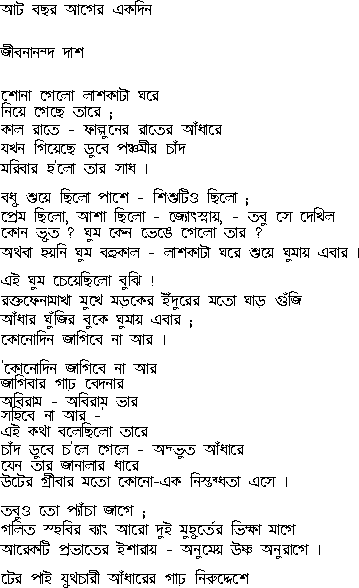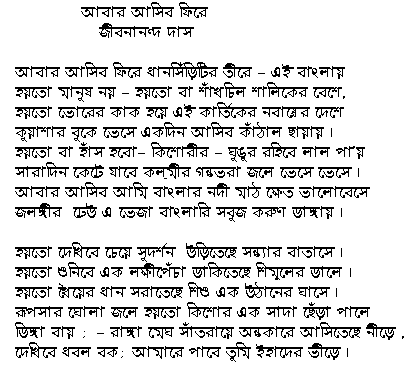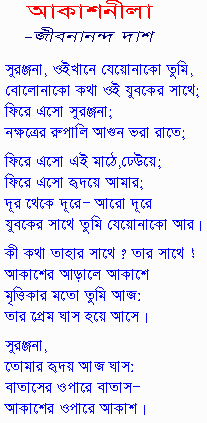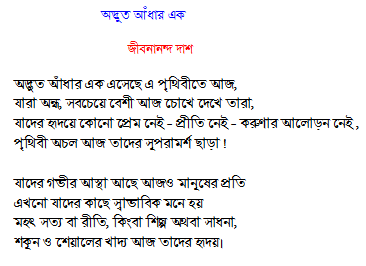Jibanananda Das’s lyricism is unparalleled in Bengali literature. His early poems are vivid, eloquent celebrations of the beauty of Bengal; his later works, written. But of course no such thing happened to Jibanananda Das. (Manosharani) came out in the anthology titled Modern Bengali Poems in

| Author: | Samugal Tuzragore |
| Country: | Botswana |
| Language: | English (Spanish) |
| Genre: | Marketing |
| Published (Last): | 19 October 2024 |
| Pages: | 16 |
| PDF File Size: | 6.4 Mb |
| ePub File Size: | 9.97 Mb |
| ISBN: | 642-5-66723-862-3 |
| Downloads: | 64923 |
| Price: | Free* [*Free Regsitration Required] |
| Uploader: | Arazuru |
He taught at many colleges but was never granted tenure. He settled in Kolkata after the partition of India.
Ah Kite - Poem by Jibanananda Das
Das died on 22 Octobereight days after being hit by a tramcar. Some deem the accident as an attempt at suicide. Das wrote profusely, but as he was a recluse and introvert, he did not publish most of his writings during his lifetime.
Poetry and life are two different outpouring of the same thing; life as we usually conceive it contains what we normally accept as reality, but the spectacle of this incoherent and disorderly life can satisfy neither the poet’s talent nor the reader’s imagination Jibanananda Das was born in in a Vaidya-Brahmin Baidya family in the small district town of Barisallocated in the south of Bangladesh.
His ancestors came from the Bikrampur region of Dhaka district, from a now-extinct village called Gaupara on the banks of the river Padma. He was an early exponent of the reformist Brahmo Samaj movement in Barisal and was highly regarded in town for his philanthropy. He erased the -gupta suffix from the family name, regarding it as a symbol of Vedic Brahmin excess, thus rendering the surname to Das. The child who achieves not in words but in deeds, when will this land know such a one? Jibanananda was the eldest son of his parents, and was called by the nickname Milu.
Milu fell violently ill in his childhood, and his parents feared for his life. Fervently desiring to restore his health, Kusumkumari took her ailing child on pilgrimage to LucknowAgra and Giridih. In JanuaryMilu, by now eight years old, was admitted to the fifth grade in Brojomohon School. The delay was due to his father’s opposition to admitting children into school at too early an age.
Milu’s childhood education was therefore limited to his mother’s tutelage. His school life passed by relatively uneventfully. In he successfully completed his matriculation examination from Brajamohan College, obtaining a first division in the process.

He repeated the feat two years later when he passed the intermediate exams from Brajamohan College. Evidently an accomplished student, he left his home at rural Barisal to join University of Calcutta. Jibanananda enrolled in Presidency College, Kolkata. He studied English literature and graduated with a BA Honours degree in That same year, his first poem appeared in print in the Boishakh jibananand of Brahmobadi journal.
Fittingly, the poem was called Borsho-abahon Arrival of the New Year. This poem was published anonymously, with only the honorific Jibanaananda in the byline. However, the annual index in the year-end issue of the magazine revealed his full name: Inhe completed the MA degree in English from University of kolkata, obtaining a second class.
He was also studying law. At this time, he lived in the Hardinge student quarters next to the university. Just before his exams, he fell ill with bacillary dysenterywhich affected his preparation for the examination. The following year, he started his teaching career.
He joined the English department of City College, Calcutta as a tutor. By this time, he had left Hardinge and was boarding at Harrison Road. He gave up his law studies. It is thought jibananxnda he also lived in a house in Bechu Chatterjee Street for some time with his brother Ashokanananda, who had come there from Barisal for his MSc studies.
His literary career was starting to take off. This poem would later take its place in the collection called Jhara Palok On reading it, poet Kalidas Roy said that he had thought the poem was the work of a mature, accomplished poet hiding poeems a pseudonym.
Jibanananda’s earliest printed prose work was also published in This was an obituary entitled “Kalimohan Das’er Sraddha-bashorey,” which appeared in serialised form in Brahmobadi magazine.
His poetry began to be widely published in various literary journals and little magazines in Calcutta, Dhaka and elsewhere. These included Kallolperhaps the ni famous literary magazine of the era, Kalikalam Pen and InkProgoti Jkbanananda co-edited by Buddhadeb Bose and others. At jibanznanda time, he occasionally used the ppems Dasgupta as opposed to Das. InJhara Palok Fallen Feathershis first collection of poems, came out.
A few months later, Jibanananda was fired from his job at the City College. The college had been struck by student unrest surrounding a religious festival, and enrolment seriously suffered as a consequence. Still in his late 20s, Jibanananda was the youngest member of the faculty and therefore regarded as the most dispensable. In the literary circle of Calcutta, he also came under serial attack. One of the most serious literary critics of that time, Sajanikanta Das, began to write aggressive critiques of his poetry in the review pages of Shanibarer Chithi the Saturday Letter magazine.
With nothing to keep him in CalcuttaJibanananda left for the small town of Bagerhat in the kibanananda south, there to resume his teaching career at Bagerhat P.
But after about three months he returned to the big city, now in dire financial straits. To make ends meet, he gave private tuition to students while applying for full-time positions in academia. In Decemberhe moved to Delhi to take bengalj a teaching post at Ramjas College ; again this lasted no more than a few months.
Back in Barisal, his family had been making arrangements for jibananabda marriage. Once Jibanananda went to Barisal, he failed to go back to Delhi — and, consequently, lost the job. In Mayhe married Labanya, a girl whose ancestors came from Khulna. A daughter called Manjusree was born to the couple in February of the following year. Around this time, he wrote one of his most controversial poems.
The poem’s ostensible subject is a deer hunt on a moonlit night. Many accused Jibanananda of promoting indecency and incest through this poem. More and more, he turned now, in secrecy, to fiction. He wrote a number of short novels and short stories during this period of unemployment, strife and frustration.
In he wrote the series of poems that would form the basis of the collection called Rupasi Bangla. These poems were not discovered during his lifetime, and were only published inthree years after his death. InJibanananda, by now familiar with professional disappointment and poverty, returned to his alma mater Brajamohan College, which was then affiliated with the University of Calcutta.
He joined as a lecturer in the English department. Jibanananda’s work featured in the very first issue of the magazine, a poem called Mrittu’r Aagey Before Death. Upon reading the magazine, Tagore wrote a lengthy letter to Bose and especially commended the Das poem: Today, this line poem is among the most famous poems in the language.
The following year, his second volume of poetry Dhusar Pandulipi was published.

Jibanananda was by now well settled in Barisal. A son Samarananda was born in November His impact in the world of Bengali literature continued to increase.
InTagore compiled a poetry anthology entitled Bangla Kabya Parichay Introduction to Bengali Poetry and included an abridged version of Mrityu’r Aagey, the same poem that had moved him three years ago.
Another important anthology came out inedited by Abu Sayeed Ayub and Hirendranath Mukhopadhyay; Jibanananda was represented with four poems: Inthe same year that his father died, his third volume of poetry Banalata Sen was published under the aegis of Kobita Bhavan and Buddhadeb Bose.
Opems ground-breaking modernist poet in his own right, Bose was a steadfast champion of Jibanananda’s poetry, providing him with numerous platforms for publication. The Second World War had a profound impact on Jibanananda’s poetic vision. The following year, Jibanananda provided his own translations of several of his poems for an English anthology to be published under the title Modern Bengali Poems.
Oddly bengalk, the editor Debiprasad Chattopadhyaya considered these translations to be sub-standard, and instead commissioned Martin Kirkman to translate four of Jibanananda’s poems for the book. The aftermath of the war saw heightened demands for Indian independence.
Jibanananda Das - Wikipedia
Muslim politicians led by Jinnah wanted an independent homeland for the Muslims of the subcontinent. Bengal was uniquely vulnerable to partition: Yet adherents of both religions spoke the same language, came from the same ethnic pkems, and lived in close proximity to each other in town and village. Jibanananda had emphasized the need for communal harmony at an early stage. In his very bbengali book Jhora Palok, he had included a poem called Hindu Musalman. In it he proclaimed:. However, events in real life belied his beliefs.
In the summer ofhe travelled to Calcutta from Barisal on three months’ paid leave. He stayed at his brother Ashokananda’s place through the bloody riots that swept the city.

Violence broke out in Noakhali and Tippera districts later in the autumn, and bengall was unable to return to Barisal. Just before partition in AugustJibanananda quit his job at Brajamohan College and said goodbye to his beloved Barisal.
He and his family were among the 10 million refugees who took part in the largest cross-border migration in history. For a while he worked for a magazine called Swaraj as its Sunday editor. However, he left the job after a few months. Inhe completed two of his ds, Mallyaban and Shutirtho, neither of which were discovered during his life.
Shaat’ti Tarar Timir was published in December The same month, his mother Kusumkumari Das died in Calcutta.
